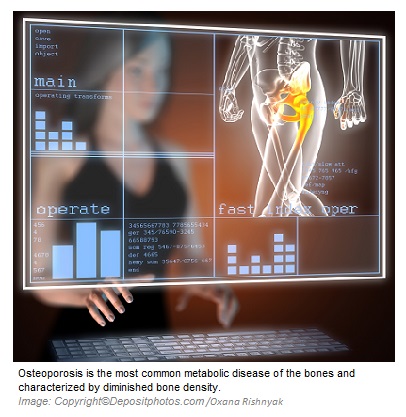
Osteoporosis is a bone disease characterized by decreased bone density. It is also known as age-related bone loss. Osteoporosis occurs due to an imbalance between bone formation and bone breakdown, in which bone formation decreases and bone breakdown increases. Osteoporotic bones are weak and easily breakable.
Osteoporosis usually does not have any symptoms unless fractures occur.
Potential contributing factors:
- Genetics.
- Ethnicity.
- Hormonal changes.
- Lack of exercise.
- Post menopause.
- Old age.
- Smoking.
- Nutritional deficiencies.
- Medications: corticosteroids, heparin, lithium, anti-epilepsy, diuretics, and chemotherapeutic agents.
- Alcohol.
- High protein diet.
- Secondary to other medical conditions: low function thyroid, hyperactive thyroid, rheumatoid arthritis, leukemia, lymphoma, anorexia nervosa, Cushing’s syndrome, diabetes, celiac disease, kidney failure, bulimia, Crohn`s disease, and gastric bypass.
Nutritional Supports:
Restricted Foods:
- Sweets and sugar.
- Soft drinks: carbonated beverages are high in phosphate, (phosphoric acid), which imbalances calcium level.
- Too much protein: more than 2gr/kg/day.
- Too much salt: more than 5 grams table salt a day.
- Coffee: drinking more than 3 cups of coffee a day makes the bones weaker by losing calcium through the kidneys and intestine.
- Alcohol: one to two drinks a day has a minimal effect on the bones. One drink equals to 12 oz or 375 ml of beer, and 5 oz or 156 ml of wine.
- Processed foods.
Recommended Foods:
- Whole grains.
- Fresh fruits and vegetables.
- Foods high in calcium: dairy products.
- Foods high in boron: prunes, parsley, raisins, almonds and peanuts. Boron is a mineral that increases absorption of calcium, magnesium, and vitamin D, and enhances production of estrogen.
- Foods high in vitamin D: salmon and catfish.
- Foods high in Omega-3: fish, flaxseeds, chia, hemp seeds and walnuts.
- Foods high in vitamin K2: natto (Japanese fermented soybeans), Swiss cheese, aged cheddar cheese, red meats, and egg yolks.
- Green leafy vegetables, especially seaweeds.
- Evening primrose oil.
- Soy and soy products.
Recommended Supplements:
- Calcium: 1000 mg a day.
- Magnesium: 400 mg a day.
- Vitamin D: 2000 – 5000 IU a day.
- Vitamin K2 (subtype MK7): 45 – 90 mcg a day. See “Vitamin K” under the section of “Vitamins”.
- Strontium: 340 – 680 mg a day.
- Boron: 3 mg a day. See “Boron” under the section of “Minerals”.
- Zinc: 50 -100 mg a day.
- Ipriflavone: 600 mg a day. It is made from “daidzein”, which is a type of phytoestrogen and comes from soy.Ipriflavone is effective in increasing bone density by moving back calcium from the blood to the bones, stimulating bone – forming cells, and inhibiting bone – destroying cells.
- Multivitamins – Multiminerals: A high potency product.
Miscellaneous Suggestions:
- Weight – bearing exercise.
- Liver detoxification.
- Colon cleansing.

